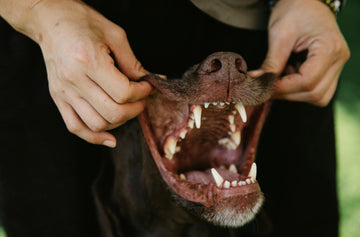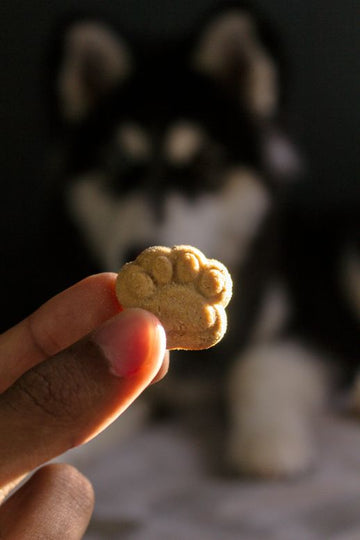Senior dogs often face dental problems such as tooth decay, gum disease, or missing teeth, making it difficult for them to enjoy regular treats. Providing the right kind of treats can help support their health while being gentle on their teeth. Here’s a guide to choosing the best treats for senior dogs with dental issues, focusing on softness, nutritional value, and oral health benefits.
Considerations When Choosing Treats for Senior Dogs with Dental Issues
-
Softness and Texture
The treats should be soft and easy to chew, as hard or crunchy treats can worsen dental problems or cause pain. Look for treats specifically designed for older dogs or those with dental sensitivities. -
Nutritional Value
Senior dogs can benefit from treats that not only are easy to eat but also provide additional nutrients to support their overall health, such as joint supplements or omega-3 fatty acids. -
Avoiding Hard and Crunchy Treats
Hard treats may be difficult for senior dogs to chew and can even cause damage to weakened teeth. Stick to softer options that are gentle on the gums.
Top Ingredients to Look for in Treats for Senior Dogs
-
Omega-3 Fatty Acids
These healthy fats can help support joint health and reduce inflammation, which is especially beneficial for senior dogs who may experience arthritis or mobility issues. -
Glucosamine and Chondroitin
Including these joint-supporting supplements in treats can aid in maintaining joint flexibility and comfort as dogs age. -
Limited Ingredients
Senior dogs can be more sensitive to certain foods. Choosing treats with limited ingredients reduces the risk of allergies or digestive upset.
Top 5 Treats for Senior Dogs with Dental Issues
- Soft Chicken Jerky Strips
- Why It’s Great: These strips are tender and easy for older dogs to chew, providing a source of lean protein. Make sure they are moist and not overly dried to ensure a soft texture.
- What to Look For: Choose natural, minimally processed chicken jerky made without added preservatives or salt.
- Peanut Butter & Banana Soft Bites
- Why It’s Great: These soft treats are easy on the teeth and offer nutritional benefits from natural ingredients like peanut butter and banana.
- What to Look For: Use xylitol-free peanut butter, as xylitol is toxic to dogs, and look for treats that use real banana for added vitamins.
- Sweet Potato Chews (softened)
- Why It’s Great: Sweet potatoes are nutrient-dense and easy to digest. For senior dogs, you can lightly steam or bake the chews to make them softer and easier to eat.
- What to Look For: Choose organic, natural sweet potato chews with no added ingredients.
- Canned Pumpkin Frozen Pops
- Why It’s Great: Pumpkin is easy to digest and provides fiber for digestive health. These treats can be made by freezing small portions of canned pumpkin in silicone molds.
- What to Look For: Use plain canned pumpkin without added sugar or spices to avoid any harmful ingredients.
- Soft Dental Chews
- Why It’s Great: Some dental chews are formulated to be softer while still helping to reduce plaque and tartar buildup. These treats are designed specifically to promote oral health without being too hard.
- What to Look For: Look for products that are veterinarian-approved and made for dogs with dental sensitivities.
Homemade Treat Options for Senior Dogs
-
Making Soft Treats at Home
Homemade treats can be customized to suit your senior dog's needs. Consider making treats using soft ingredients like oatmeal, applesauce, and plain yogurt. -
Blending Ingredients for a Softer Texture
For dogs with significant dental issues, blend ingredients into a smooth mixture before shaping and baking the treats to ensure a soft consistency. -
Adding Supplements to Homemade Treats
Incorporate joint-supporting supplements like glucosamine or omega-3-rich oils into homemade recipes for added health benefits.
Tips for Feeding Senior Dogs with Dental Issues
-
Breaking Treats into Small Pieces
Even soft treats can be made easier to chew by breaking them into small portions. This is especially helpful for dogs with missing teeth. -
Monitoring for Any Signs of Discomfort
Watch for signs that your dog is struggling to eat treats, such as excessive drooling, chewing on one side, or refusing treats. If this happens, switch to softer options or consult your vet. -
Adjusting Treat Frequency
Treats should complement your dog's regular diet, not replace it. Give treats in moderation to avoid weight gain, which can worsen joint issues in senior dogs.
Conclusion
Senior dogs with dental problems deserve treats that are not only delicious but also gentle on their teeth. By choosing soft, nutritious options that support overall health, you can ensure that your older dog enjoys their treats safely. Whether opting for store-bought or homemade treats, always consider your dog's individual needs and consult your vet if you have any concerns.





